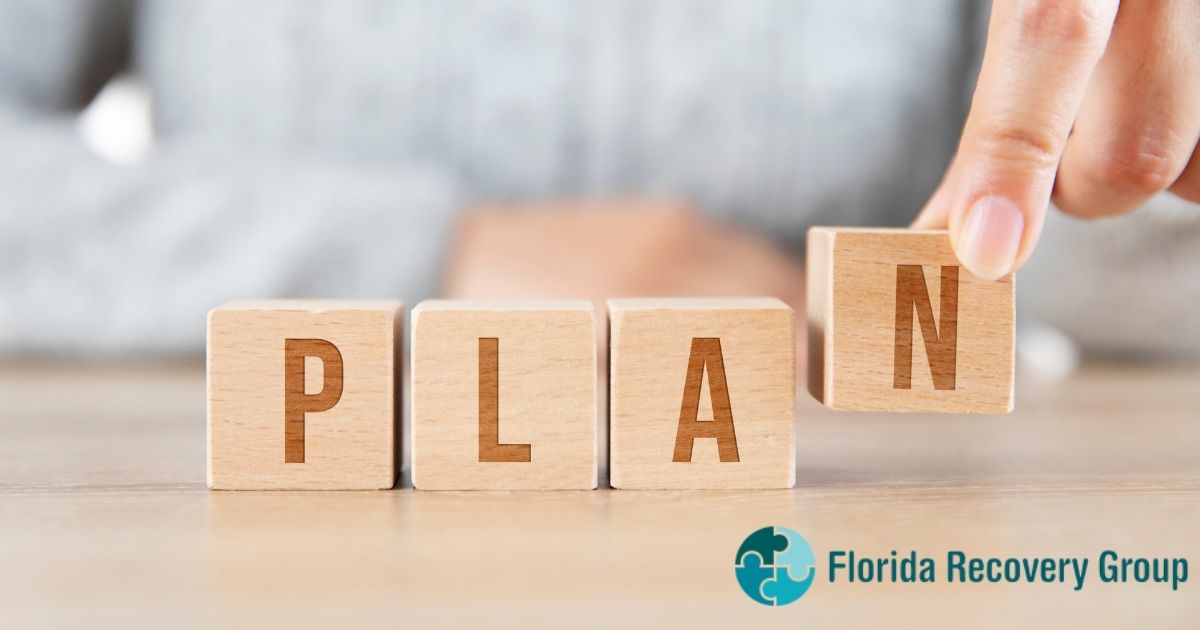
06 Dec How Do I Come Up With a Relapse Prevention Plan?
Drug addiction and alcoholism are progressive, chronic diseases that require ongoing treatment and support. Oftentimes, when a person leaves the comfort of a residential treatment facility they are at a heightened risk of relapsing. This is because the transition from treatment to normal life is often stressful, exposing newly sober individuals to unexpected triggers. However, with a relapse prevention plan, individuals have the tools they need to tackle any challenge they may face.
According to the U.S. National Library of Medicine, relapse prevention plans are a “strategy for reducing the likelihood and severity of relapse following the cessation or reduction of problematic behaviors”.[1] In other words, this tool helps newly sober individuals understand what leads to relapse while providing them with real-world solutions to prevent a lapse in sobriety.
Typically, individuals create a relapse prevention plan with the help of a therapist or addiction expert before they exit treatment. However, knowing the process of coming up with an individualized relapse prevention plan is helpful for individuals in early sobriety.
Common Causes of Relapse
Addiction relapse does not happen in one isolated moment. Instead, relapse is a gradual process that may begin months before an individual begins to abuse substances again. There are three general stages to relapse; emotional relapse, mental relapse, and physical relapse. To create an effective relapse prevention plan, it is important to understand the causes of relapse.
According to research, the common causes of relapse include:[2]
- Bottling up emotions
- Isolating from friends, family, and sober supports
- Poor eating and sleeping habits
- Allowing problems to bottle up and create feelings of tension
- Fantasizing about people, places, and things associated with substance abuse
- Craving drugs or alcohol
- Lying or thinking of excuses to use substances
- Planning a relapse
If an individual begins to allow their emotions to build up and stops practicing the healthy coping mechanisms they learned while in treatment, relapse is likely to occur. Additionally, when an individual in recovery starts feeling like they need to “escape” their feelings or the reality of their situation, they are at risk of relapsing. People often feel a lot of shame and guilt when they relapse, making it difficult to get sober again. However, when a person has a detailed plan that includes solutions for triggers, cravings, and uncomfortable emotions, they learn how to stop turning to substances in times of emotional distress.
Creating a Relapse Prevention Plan
Coming up with an individualized plan can be a difficult process. However, with guidance and personal knowledge about one’s history with addiction, creating a bulletproof relapse prevention plan is easy.
Identify Triggers and Patterns of Use
It is impossible to prevent relapse without being aware of one’s triggers and drug or alcohol abuse patterns. Researchers describe triggers as, “a stimulus that elicits a reaction”.[3] In other words, a trigger would be a person, place, or thing that causes a recovering addict to crave drugs or alcohol for relief.
Examples of triggers include:
- Driving past a place an individual used to use drugs
- Being around people drinking or using drugs
- Smelling something that reminds an individual of their past substance abuse
- Experiencing an emotion that an individual used to use substances to relieve
When an individual is aware of what causes them to crave substances, they gain the ability to avoid or manage triggers as they arise.
Utilize Healthy Coping Mechanisms
Once an individual is aware of their triggers, they need to know how to move past them. This is where healthy coping mechanisms come into play. Instead of using substances to cope, individuals should adopt positive coping skills. This could include attending weekly therapy, having a sponsor on speed dial, utilizing mindfulness techniques like meditation and yoga, or utilizing emotional regulation techniques.
Join Support Groups and Sober Communities
Being a part of a sober community is a very important aspect of addiction and alcoholism recovery. When an individual immerses themselves in a supportive environment of like-minded people, they become accountable for their sobriety. Additionally, support groups like Alcoholics Anonymous (AA) or SMART Recovery help recovering addicts learn healthy ways of coping with life stressors.
Make Healthy Lifestyle Changes
When a person is addicted to drugs or alcohol, they often partake in unhealthy and sometimes dangerous activities. For example, being in a friend group that relies on partying or using substances for fun is not conducive to living a sober life. Because of this, individuals need to adopt healthy lifestyle changes to prevent themselves from experiencing a relapse. This could include joining exercise classes, eating healthily, making friends with shared goals and dreams, and even recommitting to one’s career or education.
Relapse Prevention Planning at Florida Recovery Group
If you or a loved one have recently experienced a relapse and needs help learning how to stay sober, you’ve come to the right place. Florida Recovery Group emphasizes creating individualized relapse prevention plans to help their patients learn how to remain sober no matter what life throws at them. Contact us today for more information on how to get started.
References:





